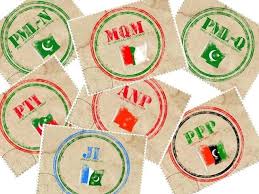Right to represent and inclusive political participation
Recognizing the historic contributions of religious minorities in the creation of Pakistan,
Remembering the un-sung heroes of freedom struggle hailing from religious minorities,
Recalling the pledge of ‘equality based citizenship’ made by the founding father of Pakistan, Quaid-i-Azam, Muhammad Ali Jinnah,
Revering all struggles and sacrifices for inclusive and pluralist polity in the country, and
Realizing the need for imminent political and electoral reforms to ensure effective and expanded participation of religious minorities,
We the concerned citizens demand;
- Review the constitutional and legal instruments on the statute book that put religious minorities in a disadvantageous position and vulnerable situations,
- Political parties as the agency of interest articulation shall adopt ‘inclusive culture’ of political participation by disbanding their separate wings for religious minorities and take tangible steps to mainstream them in the party structures at the federal, provincial and local levels,
- In order to ensure adequate representation of religious minorities in the representative democratic institutions increase the number of reserved seats in the National Assembly of Pakistan and all provincial assemblies that is corresponding to the increase in their population,
- The system of party lists for reserved seats be democratized to make it more transparent and inclusive to accommodate the genuine concerns of the religious minorities,
- Affirmative actions shall be taken to support and facilitate the religious minorities to directly contest constituencies in the elections for local, provincial and federal level democratic institutions,
- Religious minorities shall be given decision making and policy formulation positions in the governance structures including ministerial positions, and adequate representation in reforms committees like the Parliamentary Committee for Electoral Reforms,
- Honour the pledge made by the founding father of Pakistan, Quaid-i-Azam Muhammad Ali Jinnah on August 11, 1947 in his maiden speech,
- The August 11 shall be celebrated as the day of ‘Equality of Citizenship’ instead of the Day of Minorities as officially designated in 2009,
- Create an empowered statutory Minorities Rights Commission in the country and provide the religious minorities’ an effective representation in rights based institutions like the National Commission for Human Rights and the National Commission on the Status of Women etc.,
- Take concrete steps to ensure strict adherence to job quotas reserved for the religious minorities,
- Undertake long awaited educational reforms to highlight the contributions of the non-Muslims in the creation of Pakistan and their role in development of the country, and
- All intended reforms process must listen to the political and thought leaders of religious minorities as the major stakeholders.
Time has arrived for meaningful reforms and tangible steps to improve the conditions of religious minorities in Pakistan.
This Charter of Demands has been developed after extensive consultative process that was part of project, ‘Freedom of Religion and Belief in Pakistan’ being implemented with the financial support of the European Union. Centre for Civic Education Pakistan is part of consortium led by Human Rights Commission of Pakistan.
Minorities in the Constitution of Pakistan
Whereas it is the will of the people of Pakistan to establish an order :-
Wherein the State shall exercise its powers and authority through the chosen representatives of the people;
Wherein adequate provision shall be made for the minorities freely to profess and practice their religions and develop their cultures;
Therein shall be guaranteed fundamental rights, including equality of status, of opportunity and before law, social, economic and political justice, and freedom of thought, expression, belief, faith, worship and association, subject to law and public morality;
Wherein adequate provision shall be made to safeguard the legitimate interests of minorities and backward and depressed classes;
Now, therefore, we, the people of Pakistan,
Do hereby, through our representatives in the National Assembly, adopt, enact and give to ourselves, this Constitution.
(Excerpts from the Preamble of the Constitution of Pakistan-1973)
Fundamental Right
Article 20: Freedom to profess religion and to manage religious institutions.
Article 21: Safeguard against taxation for purposes of any particular religion.
Article 22: Safeguards as to educational institutions in respect of religion, etc.
Article 25: Equality of citizens.
Article 26: Non-discrimination in respect of access to public places.
Article 27: Safeguard against discrimination in services.
Article 28: Preservation of language, script and culture.
Principles of Policy
Article 36: Protection of minorities.


